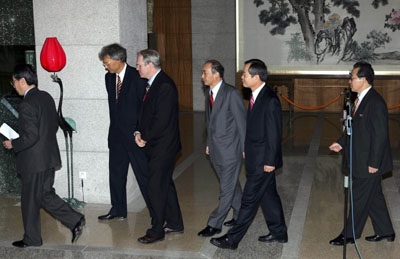N.Korea says not afraid of war after nuclear impasse
(Reuters)Updated: 2006-12-23 22:12
Seoul - North Korea's official media blamed the United States on Saturday for an impasse in talks aimed at ending Pyongyang's nuclear weapons programme and said it was not afraid of war.
The UN imposed sanctions on North Korea after it conducted its first nuclear test in October but North Korean officials had focused at the talks on trying to get separate US financial curbs lifted, envoys said.
North Korean delegate Kim Kye-gwan said Pyongyang had rejected pressure from the United States to end its nuclear programme and accept inspections of its nuclear facilities.
"We decisively opposed this and told the US side to further study our proposal," Kim was quoted as saying.
In a separate official report, North Korea said: "Sanctions and pressure will never work on the DPRK (North Korea)."
"The revolutionary armed forces of the DPRK want peace but they are not afraid of war. They will never allow anyone to infringe upon the sovereignty and dignity of their country even a bit," the report on its KCNA news agency said.
In September 2005, North Korea said in principle it would give up its nuclear arsenal in exchange for aid and security guarantees.
North Korean accounts at Macau's Banco Delta Asia were frozen after the US Treasury designated the bank as a "primary money-laundering concern", also in September 2005. North Korea said the curbs showed Washington had negotiated in bad faith.
Washington maintains the nuclear talks and the financial crackdown are separate issues and should not be confused.
The crackdown, which froze US$24 million in funds, had wide implications for North Korea because it has scared other international banks away from doing business with Pyongyang.
South Korean President Roh Moo-hyun appeared to sympathise with the North Koreans' position, asking this week why the US Treasury would act just days before the nuclear deal was struck.
"If one wants to look at it in a bad light, one may say it was all coordinated between the two (the US State and Treasury Departments)," Roh said in a speech.
South Korea's envoy said he wanted to see the six-party talks continue because they contributed to peace in the region, Yonhap news agency reported on Saturday.
The mainstream South Korean daily JoongAng Ilbo cautioned Pyongyang against dragging its heels.
"If North Korea holds its ground obstinately, it will only face more serious isolation and pain," it said in an editorial.
China, which has hosted the talks since 2003, counselled more flexibility in the negotiations and avoided placing blame on either Washington or Pyongyang for this week's failure.
The overseas edition of the People's Daily said the contending sides needed to continue talking and "make necessary compromises."
| ||
|
||
|
||
|
|



